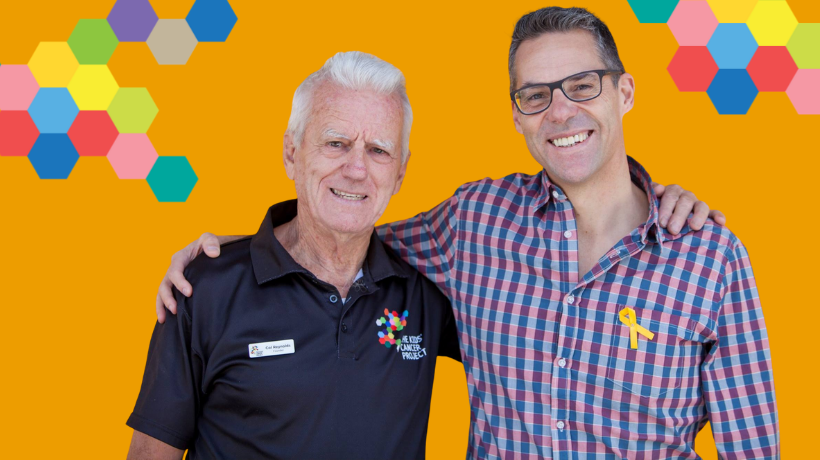New therapy shows promise in future treatment

A preclinical study has found multiple myeloma is highly sensitive to a newly developed experimental therapy, according to research published by Peter Mac scientists.
Multiple myeloma is a type of blood cancer that that originates in plasma cells, immune cells in the bone marrow that normally produce protective antibodies.
These abnormal plasma cells proliferate rapidly and do not produce productive antibodies thus reducing the body's ability to fight infection.
About 2,000 Australians are diagnosed with multiple myeloma each year.
It’s a disease most typically affecting older people. And while the average age of diagnosis is 70 years of age, the disease is known to affect people in their 20s and 30s.
So what, if any, significance does this latest finding have for children diagnosed with cancer?
The Kids’ Cancer Project collaboratively funded the work that lead to this exciting finding by Professor Ricky Johnstone’s lab.
“I would like to thank all of those who contributed to The Kids’ Cancer Project fundraising efforts," said Professor Johnstone who is Executive Director Cancer Research, Peter MacCallum Cancer Centre and Head, The Sir Peter MacCallum Department of Oncology, The University of Melbourne. "Your hard work resulted in some exciting new findings that were recently published in one of the premier scientific journals, Molecular Cell.”
“In that study, my laboratory at the Peter MacCallum Cancer Centre identified new therapeutic options for patients with blood cancers. These studies could not have been possible without your wonderful support. On behalf of myself, my team and all those affected by cancer can I sincerely thank you for your continued support,” he says.
Read more: Therapeutic targeting transcriptional addiction in paediatric leukaemias
Specific therapies will improve chances of survival for children with low prognosis leukaemias.
Significant improvements in the diagnosis, treatment and overall disease management have greatly enhanced the outcome for children suffering from leukaemia. However, despite this important progress, acute myeloid leukaemia (AML) and subsets of acute lymphoblastic leukaemia (ALL) remain characterised by poor prognosis. In these cases, current chemotherapy treatment regimens fail to completely eradicate the cancer, resulting in relapse, therapy resistance and disease progression.
This project led by Professor Ricky Johnstone looks at a set of genetic changes specific to low prognosis leukaemia patients that may be exploited to improve treatment.
These genetic changes drive cancer progression and therefore promote resistance to current therapy. However, thanks to advances in research, it’s now possible to target these genes and turn the cancer’s strength into weakness. By developing novel, more specific therapies, it will be possible to improve chances of survival for children with low prognosis leukaemias.
Dr Simon Hogg, lead author of the study published in the prestigious Molecular Cell journal today, says now for the first time Peter Mac researchers were exploring the effects of new drugs that inhibit two closely related enzymes called P300 and CBP.
P300 and CBP have long been suspected to work together to support cancer cell growth however, there have been no drugs developed that can inhibit their activity until very recently, and their exact role in cancer was not completely understood.
"We discovered that multiple myeloma is highly sensitive to this new therapy, more so than many other cancers," Dr Hogg says.
"These drugs can quickly turn off key cancer-causing genes, called transcription factors, that directly control the growth of multiple myeloma."
Transcription is a very important process in cancer, Dr Hogg says, because cancer cells need to maintain high levels of transcription to support fast growth.
This new experimental therapy works by specifically turning off many important cancer-causing genes, lowering rates of transcription in the cancerous plasma cells and leading to their death.
"Currently this experimental therapy is being tested in the laboratory only, we hope that these results might spur efforts to start testing in patients," says Dr Hogg, previously of Peter Mac and now a research fellow at Memorial Sloan Kettering Cancer Center in New York.
Peter Mac Executive Director Cancer Research Professor Ricky Johnstone – and one of the senior authors of the study – says his team also looked at how the therapy worked in combination with other drugs, identifying drugs that counteracted its effect and others that enhanced its efficacy.
"It's exciting to see these positive results in the lab and get a glimpse of the impact this new experimental therapy might have for patients with multiple myeloma." - Professor Ricky Johnstone, Peter MacCallum Cancer Centre
This research was supported by funding from the Cancer Council of Victoria, the National Health and Medical Research Council, the Haematology Society of Australia and New Zealand, and The Kids' Cancer Project.

